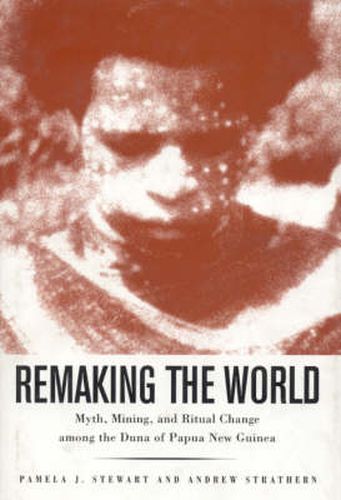Readings Newsletter
Become a Readings Member to make your shopping experience even easier.
Sign in or sign up for free!
You’re not far away from qualifying for FREE standard shipping within Australia
You’ve qualified for FREE standard shipping within Australia
The cart is loading…






The Duna, horticulturalists in the Highlands of Papua New Guinea, have an intimate relationship with their environment. Complex rituals (rindi kiniya, straightening the ground ) are used to remake their world in response to sickness, poor crop yields, and infertility. Since the 1930s the Duna have had to recast their vision in response to the encroaching outside world. Drawing on both their own fieldwork from 1991 to 1999 and older written sources, Stewart and Strathern explore how the Duna have remade their rituals and associated myths in response to the outside influences of government, Christianity, and large-scale economic development, specifically mining and oil prospecting. The authors provide in-depth ethnographic materials on the Duna and present many detailed descriptions of ritual practices that have been abandoned. This study is a contribution to the literature on the making of cultural identity by indigenous peoples facing economic, social, and political change. Pamela J. Stewart is co-author of Collaborations and Conflicts: A Leader Through Time (1999) and a research associate in the department of anthropology and the department of religious studies at the University of Pittsburgh. Andrew Strathern is co-author of Arrow Talk: Transaction, Transition, and Contradiction in New Guinea Highlands History (2000) and is Mellon Professor of Anthropology at the University of Pittsburgh.
$9.00 standard shipping within Australia
FREE standard shipping within Australia for orders over $100.00
Express & International shipping calculated at checkout
The Duna, horticulturalists in the Highlands of Papua New Guinea, have an intimate relationship with their environment. Complex rituals (rindi kiniya, straightening the ground ) are used to remake their world in response to sickness, poor crop yields, and infertility. Since the 1930s the Duna have had to recast their vision in response to the encroaching outside world. Drawing on both their own fieldwork from 1991 to 1999 and older written sources, Stewart and Strathern explore how the Duna have remade their rituals and associated myths in response to the outside influences of government, Christianity, and large-scale economic development, specifically mining and oil prospecting. The authors provide in-depth ethnographic materials on the Duna and present many detailed descriptions of ritual practices that have been abandoned. This study is a contribution to the literature on the making of cultural identity by indigenous peoples facing economic, social, and political change. Pamela J. Stewart is co-author of Collaborations and Conflicts: A Leader Through Time (1999) and a research associate in the department of anthropology and the department of religious studies at the University of Pittsburgh. Andrew Strathern is co-author of Arrow Talk: Transaction, Transition, and Contradiction in New Guinea Highlands History (2000) and is Mellon Professor of Anthropology at the University of Pittsburgh.